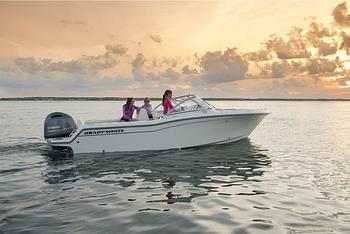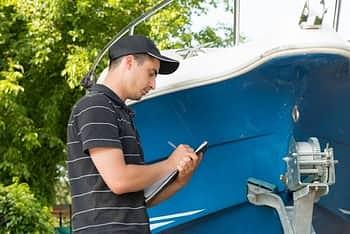Buying a boat is a hugely exciting time, and up to this point you’ll have been whisked along on a journey of searches, walk-throughs, and sea trials until you found ‘the one’. If you’re new to buying a boat or want to refresh your memory before buying your next, check out our comprehensive guide on How to Buy a Boat first.
Once you’ve made your choice and you’re ready to sign on that dotted line, it’s time to arrange the required paperwork and know what taxes must be paid. While there are a few differences, for the most part the paperwork is the same whether you’re buying a used boat or a new one. In this article, we take a look at what you’ll need to do to seal the deal and become the owner of your chosen boat.
Paperwork for Buying a Boat
Paperwork and taxes for buying boats will be different all over the world, and in the United States, each state will have slightly different requirements.
-
Bill of sale:
The bill of sale—also known as the Boat Purchase Agreement—is one of the most important documents you’ll have to look through and sign when buying your boat. It’s the transaction between you, the buyer, and the seller. The bill itself is a fairly simple document, but will include a lot of important information that you need to keep safe for the time you own the boat. While a Bill of Sale isn’t legally required in all states in the US, it’s always a good idea to ask for one anyway as evidence of the transaction. A Bill of Sale will include:
- A description of the boat including the hull identification number (HIN)*, brand, model, year of manufacture, length, and any electronics or accessories that are included in the sale. The HIN should be permanently marked on the port side transom and match that on the Bill of Sale. If the boat has an outboard motor, it should be listed separately with its serial number.
- The purchase date
- The sale price
- The signatures of both seller and buyer
- The name, address, and contact information of both buyer and seller
- The state registration number
- Trailer Vehicle Identification Number (VIN) if it’s being sold with the boat

-
Boat title and/or registration:
In the US, boat titles are issued by each state (although not all states require them), and whenever a boat is bought or sold, a new one will be issued to the new owner. A boat title is ultimately a legal document that proves ownership. If the seller used a loan to buy the boat (see our guide to Boat Financing if it’s something you’re considering) then the outstanding loan will be noted on the title and you won’t be able to register it until it has been cleared.
Which brings us to boat registration. In the US, a few states don’t require boat titles but instead ask for a boat registration. In fact, most boats require a registration whether they have a title or not. All engine-powered boats will need to be registered with a state boating agency or with the federal government, and in some states other types of boats, too.
In the UK, all boat registration is managed by the UK Ship Register, and how you register depends on what the boat will be used for and how big it is. Once registered your boat will fly under the red ensign flag to prove nationality and ownership, administered by the UK Government’s Maritime and Coastguard Agency. All boats operating on inland waterways (including paddleboards and kayaks) need to be registered.
In the US, you’ll be issued with a registration number which consists of a two-letter state code and a series of numerals and letters which must be displayed on both sides of the bow. It needs to be updated every year or two, so keep in mind this isn’t valid for the duration of your ownership.
-
Trailer:
Some states require that a trailer be registered separately in the same way that a car or other type of road vehicle would. Be sure to check what the requirements are in your state.
-
Warranty cards:
If you’re buying a new boat then the dealer will ensure that you receive all the relevant warranty cards and explain how to use them if necessary. Warranties are one of the biggest perks of buying a new boat so be sure to keep them safe and know what’s included. Likewise, you might be buying a used boat that is still within its warranty, so make sure the owner passes them on to you. If anything goes wrong during the warranty period they will save you a lot of money.
-
Maintenance records:
Maintenance records are of course only relevant for used boats and while they’re not imperative it’s certainly good to have them. Maintenance records will detail the condition of the boat, what repairs have been made, when, and by whom. A regular maintenance schedule is important, and having the records means you can keep up to date with them and know what has been done before you owned the boat. It can also add value to the boat when it comes time for you to sell it.
-
Boat license:
Different countries and states will have different requirements (and some have no requirements at all) for boat licenses, so it’s important to know the requirements in your area before you start using your boat. While regions such as Europe have had boating licenses for years, licensing in the United States is a relatively new phenomenon. Not all states are requiring them, however, and there is a gradual roll-out in others starting with younger boat operators.
Earning a boat license in the US will usually require you to take a course to ensure you know the marine code of conduct and safety information. Most courses are available online and take around three to six hours. In the UK, you need to apply for a UK Pleasure Boat License, while in the EU, it’s an International Certificate of Competence (for more information see our guide to Boating Licenses).
-
Boat insurance:
Boat insurance isn’t legally required in a number of countries or states. However, it is required by most finance lenders and marinas, plus it just makes plain sense to have it. Boat insurance can be purchased the same way as car insurance, with policy costs depending on the size and type of boat, its location and where it's used, and its price.
-
Builder’s certificate:
This is relevant mainly if you’re buying a new boat, but it’s also good to ask for it if you’re buying a used boat. When buying a new boat, the dealer will issue you with a Builder’s Certificate from the vessel’s manufacturer. It will detail information about the boat, the contact information of the builder, and confirm your ownership.

Taxes When Buying a Boat
In addition to the paperwork you need to gather, you should also be aware of what taxes you’re liable to pay when owning a boat. Again, this varies from country to country, so here we take a look at some of the taxes plus some ideas on how you can make deductions.
Boat taxes in the US
Differently than in many other countries, in the US there is no federal tax imposed when buying a boat. However, there will often be taxes by US states depending where you buy the boat, where you keep it and where you use it. Having said that, there are three main kinds of taxes you’re likely to come across;
Sales tax: Most, but not all, states impose a sales tax, and the rates vary considerably. While some states such as Delaware and Rhode Island,have no sales tax on boats, others such as Florida and New Jersey will have a flat rate sales tax—often between around three and six percent—but it is capped. There may also be a small amount of local or municipal sales tax added on too.
Use Tax: This relates to where you keep and use your boat. You shouldn’t have to pay tax in more than one state, so if you buy your boat in one state— and pay sales tax there—you shouldn’t have to pay any use tax if you choose to keep it and use it in another state. If you haven’t paid sales tax, however, then you will be liable for use tax in the state in which you are keeping and using your boat. Use tax is also around the five percent mark but again varies widely.
Property Tax: In most states, but again not all, annual personal property tax will need to be paid in addition to any sales or use tax you might have paid.
Taxes when Buying a Boat Outside the US
Each country or region will have its own requirements when it comes to taxes, and in the EU you must pay tax on the purchase of a new boat that was built in or brought into the region. Value Added Tax (VAT) will need to be shown anytime the boat is brought into EU waters—from the UK for example—and anytime the boat is sold. The VAT system in the EU is quite complex, especially since Brexit for those buying boats in the UK, but the most important thing to remember when buying a used boat is that you need to ensure you ask about its VAT paid status and get evidence of it. Otherwise you are liable to pay it again. Use our guide on the 9 Common Mistakes When Buying a Used Boat to help you navigate the bureaucracy.
Ways You Can Make US Boat Tax Deductions
There are ways you can make tax deductions on your boat, but of course it goes without saying that it must be a genuine use. It’s not worth falling foul of tax avoidance laws to save a few pennies. Here are several deductions of which boat owners might not be aware:
- Charter Boat Tax Deductions: You can charter your boat and claim tax deductions against depreciation, maintenance, boat equipment, fuel, and mooring costs. You will need to prove you are legitimately trying to run a small business with your boat (and often making a profit), as well as ensuring you have the necessary insurance and a U.S. Coast Guard license to take out six paying passengers.
- Primary Residence Boats: If you legitimately live on your boat then you can receive the tax benefits that you would with a house. It’s important that it is genuinely your primary abode, and you would have to prove that to the IRS.
- Second Home Mortgage Interest: It is possible to deduct mortgage interest on second homes, which also applies to boats. Meaning, if your boat could reasonably be used as a second home—it will need a cabin, bathroom and galley at the very least—you can make the deduction.
- Business Entertaining Aboard: You can use your boat as an entertaining space for your business and make tax deductions on that as well as expenses. You’ll need to keep itemized receipts in the same way you would if you were taking clients to a restaurant, and be able to prove that there was a good reason—with expected future revenue potential—from the meetings. The limit of deduction is 50 percent of the costs of the outing.
- Boat for Transportation: If you use your boat for commuting to work, at least 50 percent of the time, you can deduct many of the running costs including fuel, insurance, maintenance, marina fees and depreciation.
Related Articles and Guides
7th Jun 2024
Best Boat Brands for Beginners: Power, Sail, Pontoon & Fish
25th May 2024
Boat Inspection Checklist: How to Inspect a Boat Before Buying
4th May 2024
Do You Need a License to Sail a Boat in the US?
28th Nov 2023






